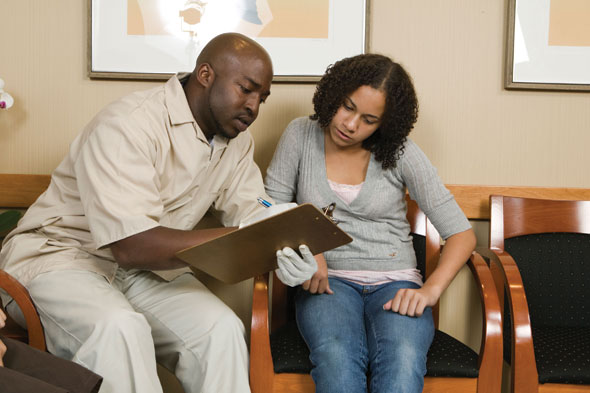social work
The Birds and the Bees, For Goodness Sake
Why “the talk” is the best way to keep teens healthy
by Courtney E. Martin / GAL ’04
“One in two Latino girls in the U.S. will become pregnant by the age of 20,” professor Vincent Guilamo-Ramos says. Suddenly the framed print of Salvador Dali’s infamous melting clock, positioned just above the file cabinets that fill his office in the Silver School of Social Work, seems a foreboding symbol.
Guilamo-Ramos knows firsthand that we are failing another generation of teenagers when it comes to sexual education. To address this, Guilamo-Ramos is examining how parents can help prevent unintended pregnancies as well as HIV/AIDS and other sexually transmitted infections (STIs) among adolescents through a five-year, $3.2 million study involving 900 Latino and African-American families in the South Bronx. He reaches out to parents in physicians’ offices when they bring their teens for checkups and offers them the latest sobering statistics: Nearly half of 15- to 19-year-olds have had sex, accounting for a disproportionate number of STIs among them. With these and other facts at hand, Guilamo-Ramos and his researchers coach parents on how to have “the talk.”
It sounds simple enough, but the method is surprisingly innovative. Until now, most sex-ed interventions have tended to neglect parental involvement altogether, or required already busy parents to attend ongoing meetings. Guilamo-Ramos saw an opportunity, however, to reach them at a time when they’re focused on their child’s well-being. Rather than flipping through a magazine in the doctor’s waiting room, parents meet a social worker who provides them with information and concrete skills on how to navigate awkward discussions. “We’ve been approaching sex education in a way that’s been inconsistent with the reality,” Guilamo-Ramos explains. “Not only do kids say that they go to their parents to discuss their biggest decisions, but boys, as much as girls, want to have these conversations.”
While parents tend to worry about the ways risky sexual activity might prevent their kids from reaching full potential, teenagers are primarily concerned with their relationships and image. Social factors—wanting to be closer to a boyfriend or girlfriend, worrying about their reputations—provide the most pressure to become sexually active. Guilamo-Ramos has spent 10 years and received more than $12 million in federal monies to support this research, with the ultimate goal of convincing policy makers and those in the nonprofit sector that bringing tools to parents right in their community buildings, schools, and medical clinics is key to changing youth habits. “We have to get over the barriers of communication if we want to reduce the negative health consequences associated with too-early adolescent sexual behavior,” he adds.
As one of four siblings raised by a single mom in the Bronx, Guilamo-Ramos says that his mother, a native Puerto Rican, was passionate about her children’s futures but unprepared to talk to them about sex. His goal is to meet parents, just like his mom, where they are. And what does his mother think of the work he’s doing now? He chuckles when relaying the question she keeps asking him: “Where was all this when I was raising you kids?”







